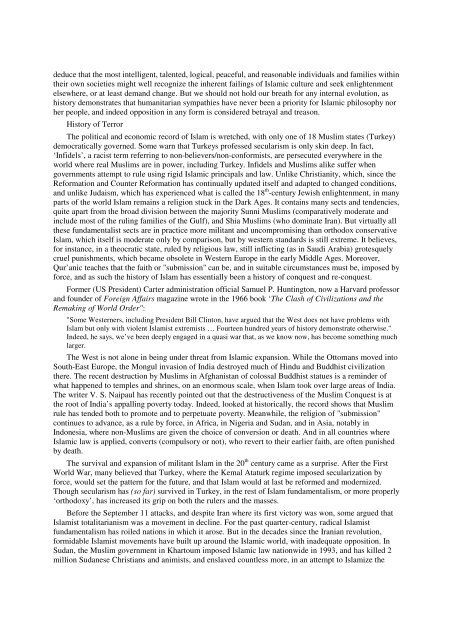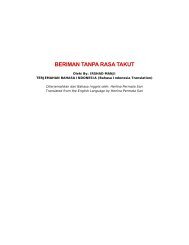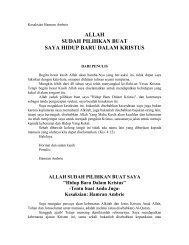A Critical Analysis of 'Real Islam'. Its People ... - Bukti dan Saksi
A Critical Analysis of 'Real Islam'. Its People ... - Bukti dan Saksi
A Critical Analysis of 'Real Islam'. Its People ... - Bukti dan Saksi
You also want an ePaper? Increase the reach of your titles
YUMPU automatically turns print PDFs into web optimized ePapers that Google loves.
deduce that the most intelligent, talented, logical, peaceful, and reasonable individuals and families within<br />
their own societies might well recognize the inherent failings <strong>of</strong> Islamic culture and seek enlightenment<br />
elsewhere, or at least demand change. But we should not hold our breath for any internal evolution, as<br />
history demonstrates that humanitarian sympathies have never been a priority for Islamic philosophy nor<br />
her people, and indeed opposition in any form is considered betrayal and treason.<br />
History <strong>of</strong> Terror<br />
The political and economic record <strong>of</strong> Islam is wretched, with only one <strong>of</strong> 18 Muslim states (Turkey)<br />
democratically governed. Some warn that Turkeys pr<strong>of</strong>essed secularism is only skin deep. In fact,<br />
‘Infidels’, a racist term referring to non-believers/non-conformists, are persecuted everywhere in the<br />
world where real Muslims are in power, including Turkey. Infidels and Muslims alike suffer when<br />
governments attempt to rule using rigid Islamic principals and law. Unlike Christianity, which, since the<br />
Reformation and Counter Reformation has continually updated itself and adapted to changed conditions,<br />
and unlike Judaism, which has experienced what is called the 18 th -century Jewish enlightenment, in many<br />
parts <strong>of</strong> the world Islam remains a religion stuck in the Dark Ages. It contains many sects and tendencies,<br />
quite apart from the broad division between the majority Sunni Muslims (comparatively moderate and<br />
include most <strong>of</strong> the ruling families <strong>of</strong> the Gulf), and Shia Muslims (who dominate Iran). But virtually all<br />
these fundamentalist sects are in practice more militant and uncompromising than orthodox conservative<br />
Islam, which itself is moderate only by comparison, but by western standards is still extreme. It believes,<br />
for instance, in a theocratic state, ruled by religious law, still inflicting (as in Saudi Arabia) grotesquely<br />
cruel punishments, which became obsolete in Western Europe in the early Middle Ages. Moreover,<br />
Qur’anic teaches that the faith or "submission" can be, and in suitable circumstances must be, imposed by<br />
force, and as such the history <strong>of</strong> Islam has essentially been a history <strong>of</strong> conquest and re-conquest.<br />
Former (US President) Carter administration <strong>of</strong>ficial Samuel P. Huntington, now a Harvard pr<strong>of</strong>essor<br />
and founder <strong>of</strong> Foreign Affairs magazine wrote in the 1966 book ‘The Clash <strong>of</strong> Civilizations and the<br />
Remaking <strong>of</strong> World Order":<br />
"Some Westerners, including President Bill Clinton, have argued that the West does not have problems with<br />
Islam but only with violent Islamist extremists … Fourteen hundred years <strong>of</strong> history demonstrate otherwise."<br />
Indeed, he says, we’ve been deeply engaged in a quasi war that, as we know now, has become something much<br />
larger.<br />
The West is not alone in being under threat from Islamic expansion. While the Ottomans moved into<br />
South-East Europe, the Mongul invasion <strong>of</strong> India destroyed much <strong>of</strong> Hindu and Buddhist civilization<br />
there. The recent destruction by Muslims in Afghanistan <strong>of</strong> colossal Buddhist statues is a reminder <strong>of</strong><br />
what happened to temples and shrines, on an enormous scale, when Islam took over large areas <strong>of</strong> India.<br />
The writer V. S. Naipaul has recently pointed out that the destructiveness <strong>of</strong> the Muslim Conquest is at<br />
the root <strong>of</strong> India’s appalling poverty today. Indeed, looked at historically, the record shows that Muslim<br />
rule has tended both to promote and to perpetuate poverty. Meanwhile, the religion <strong>of</strong> "submission"<br />
continues to advance, as a rule by force, in Africa, in Nigeria and Su<strong>dan</strong>, and in Asia, notably in<br />
Indonesia, where non-Muslims are given the choice <strong>of</strong> conversion or death. And in all countries where<br />
Islamic law is applied, converts (compulsory or not), who revert to their earlier faith, are <strong>of</strong>ten punished<br />
by death.<br />
The survival and expansion <strong>of</strong> militant Islam in the 20 th century came as a surprise. After the First<br />
World War, many believed that Turkey, where the Kemal Ataturk regime imposed secularization by<br />
force, would set the pattern for the future, and that Islam would at last be reformed and modernized.<br />
Though secularism has (so far) survived in Turkey, in the rest <strong>of</strong> Islam fundamentalism, or more properly<br />
‘orthodoxy’, has increased its grip on both the rulers and the masses.<br />
Before the September 11 attacks, and despite Iran where its first victory was won, some argued that<br />
Islamist totalitarianism was a movement in decline. For the past quarter-century, radical Islamist<br />
fundamentalism has roiled nations in which it arose. But in the decades since the Iranian revolution,<br />
formidable Islamist movements have built up around the Islamic world, with inadequate opposition. In<br />
Su<strong>dan</strong>, the Muslim government in Khartoum imposed Islamic law nationwide in 1993, and has killed 2<br />
million Su<strong>dan</strong>ese Christians and animists, and enslaved countless more, in an attempt to Islamize the





